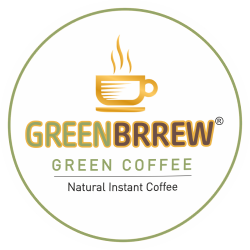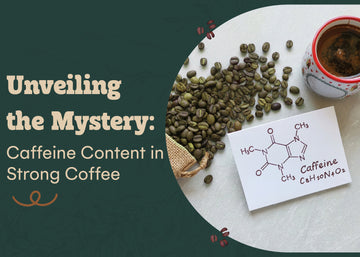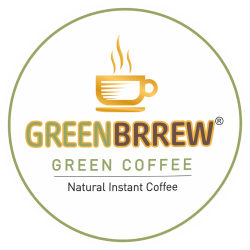Exploring the Mysteries: How Much Caffeine Is in Strong Coffee
Of all the favourite beverages in the world, it's coffee that offers diversity at the highest level concerning the taste of caffeine that may range from intense to very mild. This makes the challenge quite daunting, however not only for connoisseurs but also to neophytes, and have a coffee choice this vast - espresso, Americano, latte, cappuccino, cold brew, among many others. Each coffee is distinct and has different brewing processes, bean origin, and strength, and the quantity of caffeine will determine flavor levels. Often, caffeine content can determine which energy-giving properties the brands hold together with the appeal of their flavors based on individual needs and tolerance as opposed to taste preference. With all these questions we have to solve another problem and that is how to brew strong coffee?
The variations in the amount of caffeine between different brews, such as espresso and drip, cold brew versus regular iced coffee, can provide some insight into how preparation style impacts the extraction of the caffeine. Cold brew sits for hours, so it always has a higher caffeine dose than espresso, which presents as intense but has strong, concentrated caffeine in limited quantities. Among the varieties of coffee that are produced, there remain infinite possibilities that will be dependent upon the water temperature, grind size, and variety of bean. In this article we will also try to find answers to two other questions: does strong coffee have more caffeine and which is stronger coffee or tea?
In turn, if coffee lovers become acquainted with all the various sorts of coffee and their specific content of caffeine, it can be said that they can make better choices, eventually finding their ideal cup of coffee and, maybe discovering new favorites. Let us therefore peel away the mystery surrounding our morning favorite - the coffee.
How much caffeine is too much?
Let us begin with caffeine and take note that all these chemicals have recommended dosages. To reap the rewards of caffeine without its unwanted side effects, stick to the dosages. This question is common among all coffee lovers that does strong coffee prevent pregnancy?
The FDA enables people to take 400 mg of caffeine per day. That amounts to 4 - 5 glasses of coffee in a day. The suggested dose for a pregnant woman is 200 mg. These are typical dosages, but you have to think about how much you are tolerant of as well as health, sleep, and medicine. One person might be more sensitive to caffeine than another. To prevent any side effect of caffeine, talk with your doctor on a suitable amount of caffeine for you and your needs.
How does caffeine work?
Now that we've discussed how much of it to take, let's discuss the more exciting part—why! There are several varied advantages for caffeine. The reason so many coffee aficionados take it is for its stimulating effect, which is meant to boost energy. If we can understand some parameters then we will also get the answer to this puzzle of how to brew strong coffee? One fantastic energizer and consciousness enhancer is caffeine. There are many studies where the liver benefits from this drug. Caffeine prevents the liver from succumbing to disease. We have discussed the amount needed. Now, let's discuss why it is a fun substance! Caffeine has several unique advantages.
The energy pick-up it provides is mainly the reason most coffee-lovers love coffee. Good energizer, caffeine quickens alertness and feelings. Several researches mentioned that caffeine benefits the liver. Normal intake of this beverage helps to protect a person from various liver-related disorders. Caffeine supports the heart and enables longevity. Coffee decreases diseases of diabetes, stroke, problem in respiration, or infection. Besides that, caffeine has been known to boost mood, enhance symptoms of depression, and enhance cognitive function.
Specific amount of caffeine in a cup
Because the various sizes of the coffee shop and the size of the different cups differ, the quantity of actual caffeine in each and every one will differ as well. An average cup of coffee contains approximately 250 milliliters or eight ounces of fluid, carrying an average amount of caffeine between 80 to 100 milligrams.
Variation of Factors :
Here we will get an indication of how to brew strong coffee?
- Category of bean: Robustas have nearly double as much caffeine as Arabicas. It is recommended, therefore, that you drink more Arabica coffee rather than Robusta coffee to top up the intake of the beverage without crossing the barrier of caffeine.
- Type of brewing: The amount of caffeine in a beverage will vary with different conditions. These involve the temperature of the water, how long it takes to have an extraction process, and if a specific drink employs some form of brewing. Those that take less time to complete hold less caffeine quantities.
- The coarser grinds generally contain less amount of caffeine than the finer ones since they have a smaller surface area exposed to water when brewing.
- Further, the amount of caffeine that each cup of coffee contains depends on the amount of coffee used. Some people desire their coffee to be strong, while others opt for a higher amount of milk and cream, thus resulting in a lower amount of caffeine intake compared to their peers who drink strong coffee.
- This is the general rule for all types of roasts: the lighter, the more caffeine it holds. However, flavor grows stronger as it progresses into the darker phases of the roasting.
- The most obvious deciding factor is the size of the cup that the coffee is served in. As various outlets may sell your coffee, coffeepots may vary from place to place as to the amount of caffeine contained within a single serving, but in many you will find three or four cups. Homes that hold large cups can fill up quicker with their larger capacity as compared to small ones, allowing them to intake more coffee and its accompanied caffeine.
Coffee varieties and the amount of caffeine each contains. Apart from the many factors, the different types of beverages that carry coffee also determine the quantity of caffeine contained in the beverage. The amount of coffee in different drinks differs.
Caffeine is not absent in the case of decaf coffee
. An 8 ounce cup of most decaf coffees contains 2-5 milligrams of caffeine. Sensitive people or that have been advised to restrict the intake of caffeine do feel some side effects from those amounts of caffeine.Here we have also discussed the point that is cold brew stronger than iced coffee? So let us try to understand.
The process of decaffeination is rather interesting. Removing caffeine from coffee beans can be done through water, chemical solvents, or carbon dioxide. Most of the caffeine is removed, but impossible to remove it all. Thus, decaf coffee consumers may remain awake, particularly if drank in big quantity. Recent breakthroughs in decaffeination by the currently employed processes have made it possible for the decaffeinated coffee to have flavors and qualities more appealing than those made years ago. Knowledge about decaf coffee enables customers to decide appropriately toward life.
Conclusion
As the science behind the concentration of caffeine in different types of coffee is slowly being unraveled, it becomes abundantly clear that the strength of a coffee is not limited to its flavor. If espresso is the most intensely flavored because of its pungent and concentrated flavors, the amount of caffeine contained in other preparations make a world of difference in their overall impact. Cold brew, steeped for many hours, often contains a high concentration of caffeine, although drip coffee, served in bigger portions, can deliver a more consistent amount of caffeine. In the end, the ideal option is determined by the preferences of the individual, their tolerance to caffeine, and the effects that they look for.
Such basic knowledge of these facts provides passionate coffee lovers with the option to make a decision regarding their preferences related to choices over coffee drinks according to personal taste, along with energy requirement, through this knowledge. Accordingly, the quest for getting that perfect cup of coffee is turned into a pleasing fun journey tailored to your specific needs in which the quantities of caffeine in the prepared drink are suitably accommodated to the sensation or desire, sip by sip.



